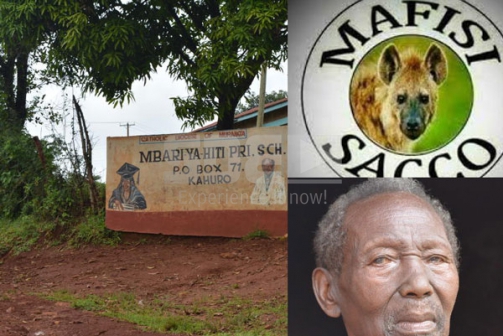
A clan in Murang’a that is known as ‘Team Mafisi’ has denied that they are related in any way with the randy ‘Team Mafisi’ members from the city.
Mbari ya Hiti (loosely translated as Hyena’s clan) in Kahuro, Murang’a County, say they should not be linked to the ruttish group famed for seducing women and salivating at women’s sexy bodies.
“Ours is a reputable clan, and we should not be linked to Team Mafisi. We are proud of this name. It belonged to our forefather who fought to have us here,” revealed Samuel Macharia, a descendant of the clan.
There was excitement on social media when word went round that Team Mafisi had attracted new followers in Murang’a, a clan that is over 100 years old.
The clan occupies an entire village and has expanded in other parts of Central region. It has a primary school, shopping centre, coffee factory and a Catholic church named after the clan.
Peter Nyaga, 98, who is the oldest descendant alive in the clan, says they got the peculiar name from his late grandfather, but maintains that none of the descendants were named after him besides the clan.
Macharia admits they were mocked, especially as a pupil at the Mbari ya Hiti Primary School. “Neighbouring schools mocked us and many young girls never liked our company,” he says.
A young woman who got married in the clan recently told The Nairobian she was reluctant to be part of the big family.
“It was hard mentioning the clan name to my parents. They too were reluctant, because they feared one of my sons would be called Hiti,” she says.
Nyaga was born in 1918, long after Hiti died, but says the community at the time named some people according to their deeds.
According to Nyaga, Hiti was chased away by his brothers from their ancestral land in Maragua in Murang’a in mid 1800s. He moved on with his herd of goats and settled at Kahuro as a squatter.
Misfortune however befell him one day after a tree fell on his herd of goats and killed many of them. It was then that the indigenous people gave him the land as compensation for his loss. The land is today the home to the expansive Mbari ya Hiti.
Macharia suspects that his great, great, grandfather may have been a schemer of sorts and that perhaps earned him the name ‘Hiti.’
“How he got this vast land proves he was smart and calculative,” says Macharia.
 The Standard Group Plc is a multi-media organization with investments in media
platforms spanning newspaper print
operations, television, radio broadcasting, digital and online services. The
Standard Group is recognized as a
leading multi-media house in Kenya with a key influence in matters of national and
international interest.
The Standard Group Plc is a multi-media organization with investments in media
platforms spanning newspaper print
operations, television, radio broadcasting, digital and online services. The
Standard Group is recognized as a
leading multi-media house in Kenya with a key influence in matters of national and
international interest.









